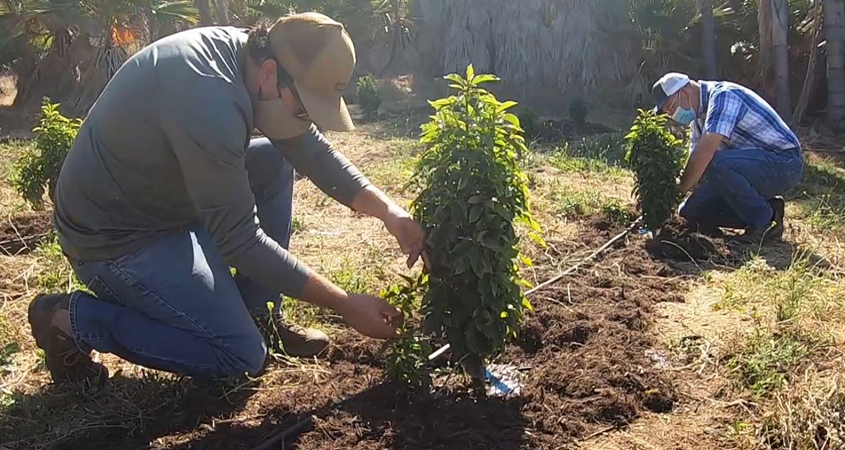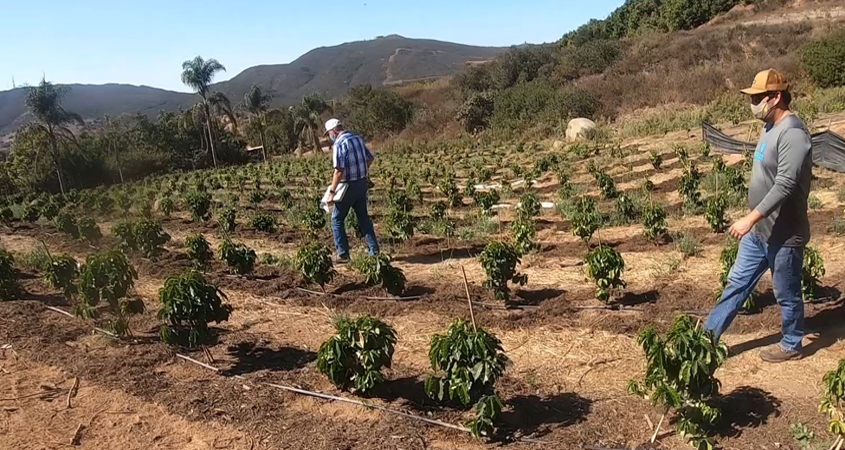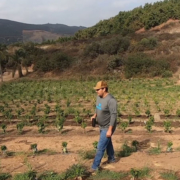Vallecitos Water District Helps San Marcos Coffee Farmer Brew Success
San Diego County agriculture is well-known for citrus and avocados. Kyle Rosa is counting on coffee joining this list.
Rosa, owner of Bluetail Coffee Grove, started growing coffee on a 2.5-acre farm in San Marcos last year. After 15 years in the finance industry, Rosa and his wife moved from San Francisco to start their new venture. The new farmer quickly turned to the Vallecitos Water District for help establishing smart water use and efficient systems to irrigate his six different specific types of coffee.
The Vallecitos Water District offers a free agricultural irrigation audit to ensure its farming customers are using water aligning best with their crop’s specific needs and water-efficiency standards.
“No one has ever done this in the continental United States,” said Rosa. “To be able to be a pioneer and work on something that has never been done and to learn from mistakes is exciting.”
Agriculture audit gauges efficient water use

Coffee farmer Kyle Rosa (left) and Lance Andersen examine irrigation emitters at his San Marcos farm. Photo: Vallecitos Water District
Lance Andersen, agricultural program manager from Mission Resource Conservation District, performed the audit. MRCD provides free agricultural evaluations to farmers and growers through a partnership with Vallecitos and the San Diego County Water Authority. The agricultural audit examined 2,000 of the Bluetail Coffee Groves trees and 4,000 emitters to see how much water is currently used.
Auditors study how evenly water is flowing across the planting area, so growers can make informed decisions on irrigation scheduling and water management. Post-audit, farmers receive a Google image to assist in the best placement for soil moisture sensor stations to monitor irrigation in real time.
“Lance has been able to give us some pointers as he walked through the farm,” said Rosa. “We have some areas of improvement to add swales to retain water when it rains on our slopes and to prevent soil erosion.”
MRCD also provided information about financial assistance available for the installation of the soil moisture sensors.
Vallecitos Water District assisted Rosa in securing an agricultural rate for his irrigation. He worked with Chris Robbins, Vallecitos Water District supervisor of public information/conservation to start the process.
“He could not have made it any easier for me,” said Rosa.
Bluetail Coffee Grove is an organic farm. Rosa’s farm is undergoing the organic certification process, which takes three years.
Coffee farm plans for eco-tourism

Kyle Rosa and Lance Andersen perform a walk through as part of an agricultural irrigation audit. Photo: Vallecitos Water District
Rosa has ambitious plans to put San Marcos on the coffee map.
“Coffee has a similarity to wine, where the method of creating a cup of coffee is so diverse and so labor-intensive,” explained Rosa. “When you finally get a cup of coffee, everybody has different tastes. Being able to produce those different tastes for a variety of people while having complex notes within our coffee is really what we are striving for.”
Rosa says he hopes his initial business model will work, allowing him to open his farm to eco-tourism.
“The goal is to expand the coffee to have an eco-tourism set up at the farm, where we can roast and try coffee right here and pull the cherries right off the tree and taste the coffee right here for yourself right in beautiful San Marcos, California.”
Before then, Rosa will open a retail store, Breakers Coffee + Wine in the Del Mar Heights area, expected in Spring 2021.




